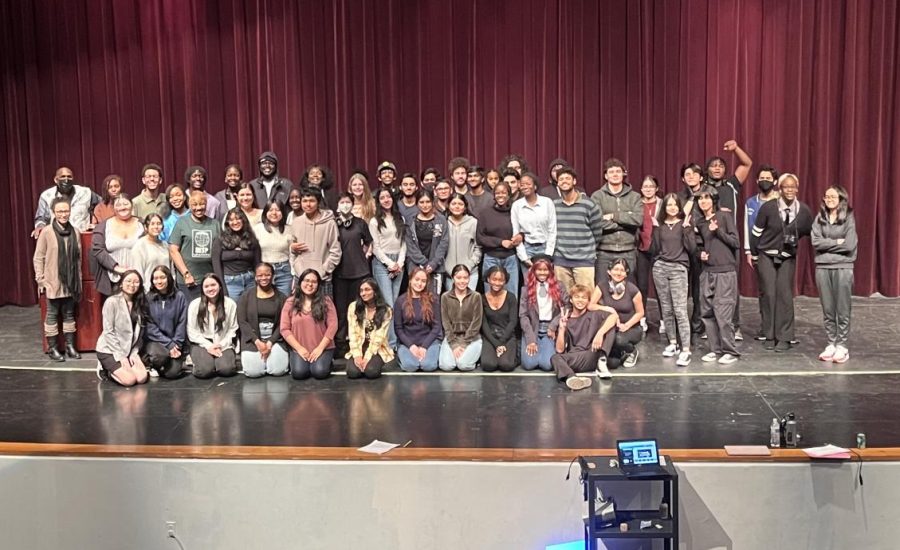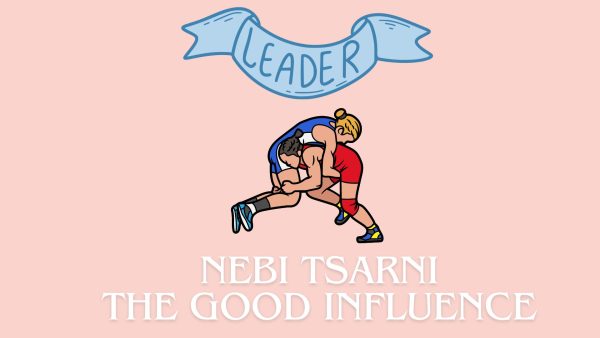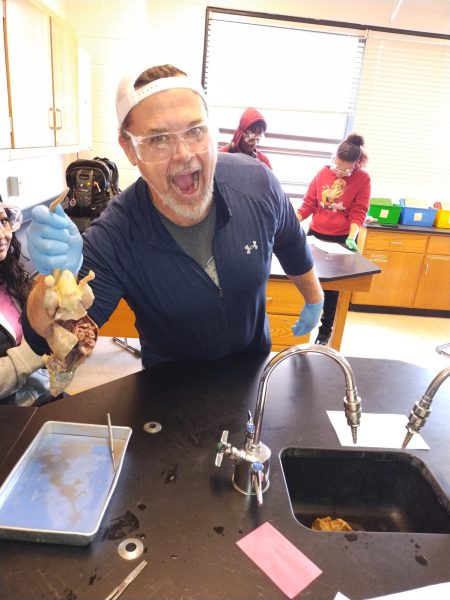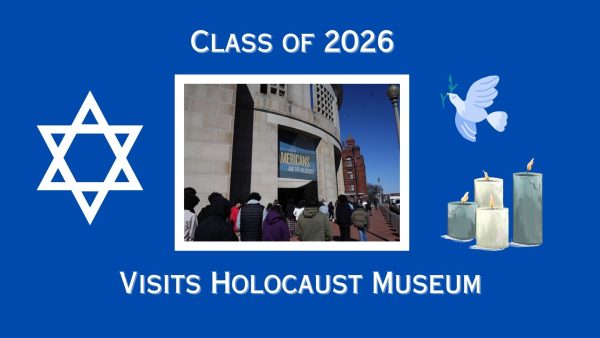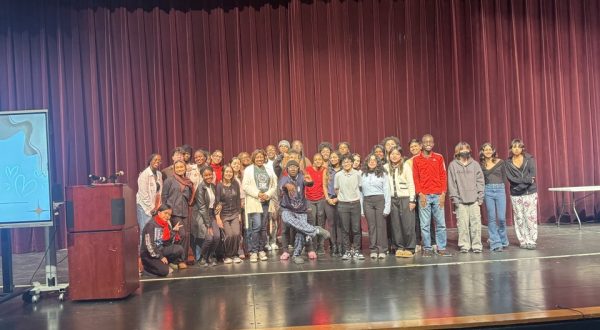MSP hosts town hall on impacts of white washing
MSP and all town hall attendees gather for a picture together at the end before heading to the cafeteria for pizza.
Watkins Mill’s Minority Scholars Program (MSP) held a town hall addressing the history and impact of white washing in the Timothy O’Shea theater on Friday, February 17.
Co-presidents of MSP, seniors Ashley Huynh and AJ Gordon, helped lead the town hall preparations. “I was impressed with the interest and personality put into the slides,” Gordon said.
Seniors Sarah Bamba and Melissa Osei-Bonsu, the emcees for the event, led the town hall with excitement, and introduced Montgomery County Councilmember Will Jawando. Jawando has advocated for social justice in his political career and provided opening remarks to help kickoff the town hall.
The town hall was mainly composed of three different groups, each covering a different topic within whitewashing. Examples of cultural appropriation, white washing in media, and whitewashing in history were all discussed by members of MSP who volunteered to be speakers. “I think [speaking at the town hall] inspired our own students because we could see how our voices can reach higher platforms,” Gordon added.
The town hall presentation began with the whitewashing in history group, and students presented information on lesser-known events that have been subjected to white washing, including the Tulsa Race Massacre of 1921, the Osage Indian Murders of the 1920s, the Rock Springs Massacre of 1885, and even about the actions of the current Florida Governor Ron DeSantis.
The presentation concluded with a poem written by Bamba titled POV, written from the perspective of a white washer, highlighting the injustices that have been committed against people of color throughout history.
“I leave you with / A past rewritten, to fit a certain order / A story void of all color / My story, / Allow me to introduce / A whitewashed history,” Bamba said.
The white washing in media group presented on book and film representation, the removal of ethnic features, and white washing in the fashion. Huynh shared a personal story about the intersection of whitewashing and internalized racism, called I said Mulan was my favorite princess. ‘Why would you pick the ugliest one?’ .
Huynh used to “[practice] my smile in the mirror, [keep] the lid on my school lunch, and [Google] seemingly normal questions. But, in reality, I practiced smiling without making my eyes small, refused to eat ‘smelly’ ethnic food near my classmates, and researched how much double eyelid surgery costs.”
Then, the cultural appropriation section of the event came next. Students researched and presented about the following topics: cultural appropriation vs. appreciation and examples of appropriation in the Latino, Black, and Asian communities.
Senior Alassane Faye shared a personal speech, White Washing from a Foreign Perspective. “The awareness and desire to dismantle white washing isn’t anti-white,” Faye said. “It is rather anti-manipulation, anti-propaganda, and anti-jurisdiction. The desire for the full truth and representation of all races shouldn’t be a privilege, it’s a right.”
NOVA, Watkins Mill’s K-pop dance team, concluded the town hall with a performance, rounding off an afternoon filled with important conversations and the highlighting of integral, long-lasting issues regarding white washing.
Integral members of the Watkins Mill community, including principal Carol Goddard and assistant principals Ryan Graves, Kerry Cunningham, Francisco Valverde, and Marcus Wiggins were all able to attend the town hall and saw the community come together to learn about issues that were important to students.
MSP founder Michael Williams and MSP county coordinator, Vilma Nájera also made the trek to Watkins Mill to support the students.
“And I’m very glad that our administration was able to come out and that some other people from the MSP overarching organization were able to come out,” Huynh said.
Many student presenters at the town hall were doing public speaking for the first time, including freshmen Tracy Espinoza and Junee Kim, who presented about how white washing pushes many people of color to surgically remove their ethnic features. Huynh and Gordon had minimal speaking roles and were happy to work behind-the-scenes so their members could showcase the research and dedication put into the town hall.
Huynh and Gordon began preparing for the town hall in all the way back in November. “There’s a lot of work that goes into preparing for the town hall, so it’s crucial to start as early as possible,” Huynh said. They consistently prepared throughout the months of December and January, leading into the opening weeks of February.
“I enjoyed how I saw people put in their focus of how whitewashing impacted them,” Huynh added.
Helena Tran is a Pre-International Baccalaureate Diploma sophomore at Watkins Mill High School and is a Staff Writer of The Current. Helena is a part of...


